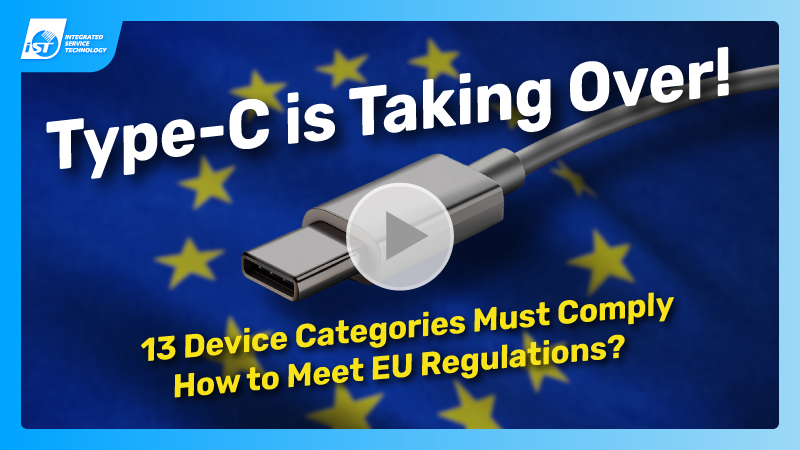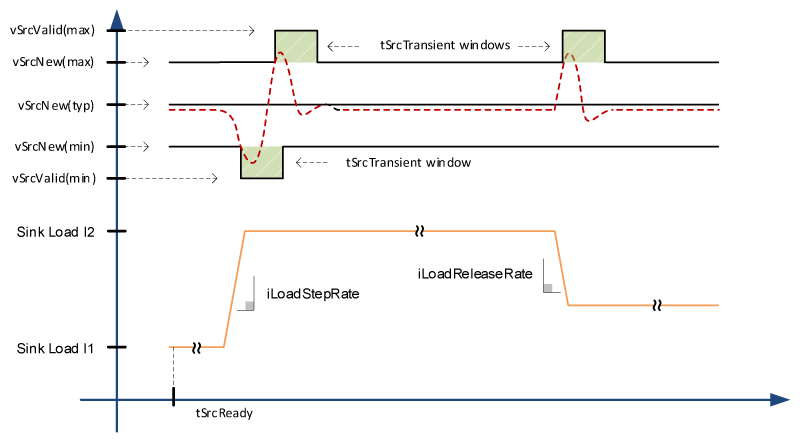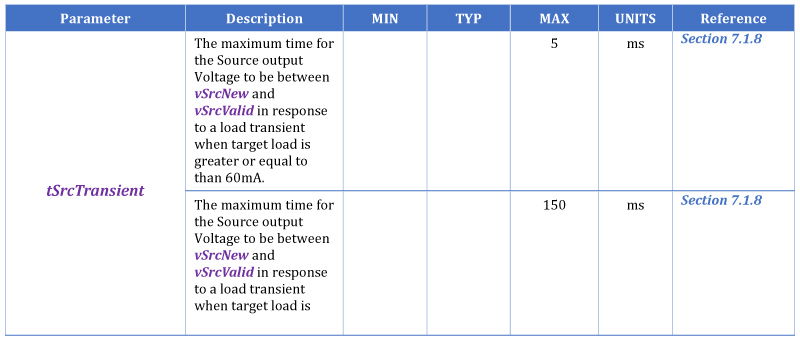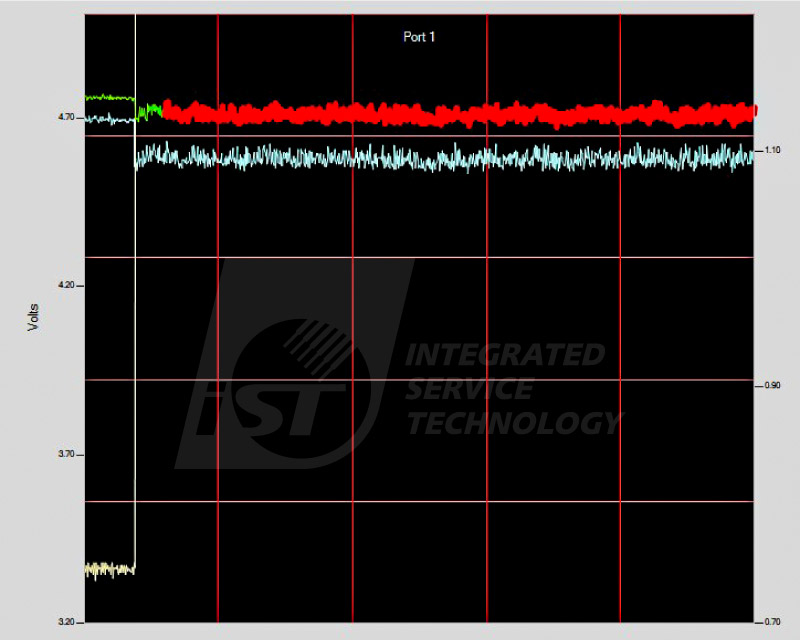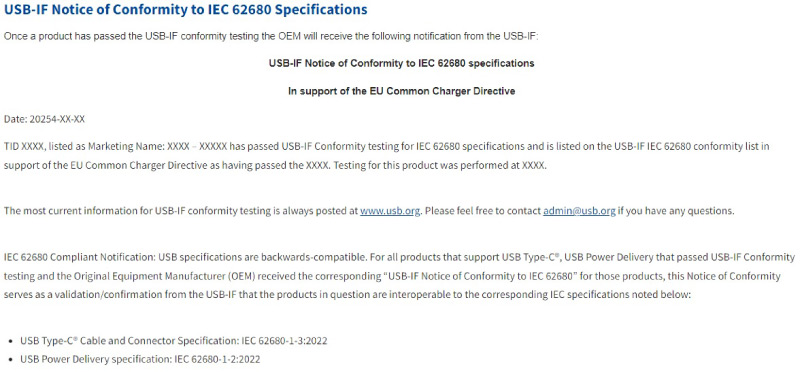Issued Date:2024/9/24USB Type-C
Issued By:iST
The European Union (EU) is set to mandate the use of USB Type-C ports for electronic devices by the end of 2024. As the deadline approaches, how can businesses ensure that their products meet the IEC 62680 standards and remain competitive in the EU market?
USB Type-C
USB Type-C is rapidly becoming the universal interface standard worldwide. According to Directive (EU) 2022/2380, which amended the Radio Equipment Directive (RED), all portable battery-powered devices, excluding laptops (which will be included from April 28, 2026), must adopt USB Type-C charging ports by December 28, 2024. This applies to 12 device categories, including handheld mobile phones, tablets, digital cameras, headphones, headsets, handheld videogame consoles, portable speakers, e-readers, keyboards, mice, portable navigation systems, earbuds, laptops. This will significantly enhance interoperability among devices, provide consumers with more convenient charging solutions, and reduce electronic waste.
All devices covered by this directive must comply with IEC 62680-1-3:2021 (USB Type-C® Cable and Connector Specification) for charging via a USB Type-C cable. Furthermore, devices capable of being recharged through wired charging at voltages higher than 5 Volts, currents higher than 3 Amperes or powers higher than 15 Watts, must meet the IEC 62680-1-2:2021 (USB Power Delivery Specification) to ensure fast and efficient charging under different conditions.
To offer OEMs/ODMs a simple and cost-effective testing process for the EU’s focus on USB Type-C device charging capabilities, the USB Implementers Forum (USB-IF) launched the USB-IF Conformity to IEC 62680 (USB) Specifications Program in late August 2024. This program addresses the EU Common Charger Directive for USB Type-C charging functionality, ensuring that manufacturers can meet regulatory deadlines. In this article, we will discuss key tests based on this new program and share practical examples from iST’s Signal Integrity Test Lab to help your product navigate the EU market.
USB Type-C
USB Type-C
1. USB-IF's Latest IEC 62680 Test Guidelines for EU Type-C Compliance
USB-IF has distilled the complex IEC 62680 (USB) specifications into a set of essential tests to meet the EU Common Charger Directive for Type-C interfaces. The full set of tests can be found on the USB-IF website.
2. Understanding the Conformity to IEC 62680 Testing Requirements
Directive (EU) 2022/2380 supplements the specific requirements outlined in Article 3.3(a) of the Radio Equipment Directive (2014/53/EU) regarding universal charging interfaces. It ensures that 13 categories of portable battery-powered devices adopt USB Type-C charging ports. iST Signal Integrity Test Lab highlights three test categories to ensure compliance with the Conformity to IEC 62680 program:
(1) USB Type-C Functional Test Specification:
This test verifies whether a USB Type-C device meets the functional requirements of the USB Type-C specification. It covers multiple USB Type-C operation modes, including:
- UPF/DFP (Upstream Facing Port/Downstream Facing Port):
Verifies the functionality and compatibility of devices acting as either a Host or Device. - DRP (Dual Role Port):
Checks the device’s ability to switch between Host and Device roles.
These tests ensure that USB Type-C devices operate correctly across various devices while meeting electrical and timing requirements for stable functionality.
(2) USB Power Delivery Compliance Test Specification:
This test ensures that devices comply with the USB Power Delivery 3.1 standards, specifically for devices supporting PD. It includes:
- Voltage, Current, and Power Requirements:
Verifies the device meets the voltage and current levels specified in the USB PD standard. - Functionality in Different Modes:
Specifically tests the device’s performance and backward compatibility in PD2 Mode and PD3 Mode, ensuring proper functionality across PD modes. - USB Power Delivery (PD):
Ensures the device correctly supports USB PD in both Standard Power Range (SPR) and Extended Power Range (EPR) modes, managing power exchange and communication.
These tests ensure that USB Type-C devices can meet the power delivery requirements, ensuring safety and stability in real-world usage.
(3) USB Source Power Test Specification:
- Load Test:
Verifies voltage and current performance under varying loads. - Overcurrent Protection (OCP):
Check whether the device can activate protection mechanisms to prevent damage in overcurrent conditions. - Multi-Port Power Management:
Tests the power distribution and management capabilities of devices with multiple Type-C ports.
These tests ensure that USB Type-C power sources provide safe, stable, and reliable power under various conditions and across multiple ports.
- UPF/DFP (Upstream Facing Port/Downstream Facing Port):
3. iST Case Studies
iST Signal Integrity Test Lab uses USB-IF certified test equipment to conduct compliance testing, logging failures to assist clients in debugging and achieving certification. Here are two case studies:
(1) Case 1: Troubleshooting Test Misjudgment Due to Compliance Test Specification Changes
During product testing, misjudgment may occur due to changes or undefined areas in the Compliance Test Specification (CTS). By reviewing the trace or log of the failed results, iST Signal Integrity Test Lab identifies the real issue, discussing it with the instrument vendor. We also join USB-IF’s weekly online meetings to see if similar issues have been addressed through an Engineering Change Requests (ECRs) that may lead to Engineering Change Notices (ECNs) and updates to the CTS, reducing debugging time for clients.
(2) Case 2: Analyzing and Resolving Low Vbus During Load Test
Resolving Vbus Undervoltage Issues in Load Testing, for Figure 1 as an example, a product failed due to Vbus dropping below the required 4.75V and not recovering within the specified timeframe. iST engineers explained the issue to the client and assisted in debugging to ensure compliance.
When the load exceeds or is below 60mA, the Source output voltage must comply with the following specifications during transient load changes (Table 1):
- For loads greater than or equal to 60mA:
The Source output voltage must return to within the range between vSrcNew and vSrcValid within 5 ms after the transient load change. - For loads less than 60mA:
The Source output voltage must return to within the range between vSrcNew and vSrcValid within 150 ms after the transient load change.
- For loads greater than or equal to 60mA:
4. How to Conduct USB-IF Conformity to IEC 62680 Testing?
To manage and track USB products, the USB-IF reviews all submitted test results for official approval. OEMs/ODMs can submit their USB Type-C products to USB-IF Independent Test Labs (ITLs) for testing. After acquiring a Vendor ID (VID) by becoming USB-IF members or purchasing it., companies can register their product on the USB-IF website to receive a Test ID (TID), allowing them to begin Conformity testing. Successfully tested products are listed on the USB-IF website and receive a compliance notification from USB-IF (Figure 3).
While this program provides a fast track to meet EU Common Charger Directives requirements, it does not cover the full USB-IF certification, which includes data transfer, reliability and interoperability testing. Fully certified products can display the USB-IF logo, which is not available for products passing only the Conformity to IEC 62680 program. Nonetheless, this new program can still help OEM/ODM manufacturers quickly test their products, further facilitating their entry into the EU market.
As an officially recognized USB Power Delivery (PD) Independent Test Lab (ITL), iST has obtained authorization from USB-IF for the latest Power Delivery 3.1 technology, along with certification testing qualifications for USB4 V1 Electrical Testing, USB 3.2, and USB 2.0. These authorizations enable iST to assist clients with USB-IF product certification, ensuring that 13 categories of Type-C rechargeable wireless devices comply with IEC 62680 standards for USB-IF conformity. For clients pursuing USB-IF logo certification, iST also provides full USB compliance testing for enhanced product assurance.
In addition, iST can provide a range of standard testing and official certification services, including USB, DisplayPort, HDMI, and VESA DisplayHDR. For various customer product functionalities, iST can customize relevant test items and, from the user’s perspective, design professional and detailed testing procedures to identify product issues and help clients solve challenging problems.
We appreciate the ongoing support from you all. If you would like to further understand the details, please feel free to contact Mr. Huang at +886-2-2792-2890 ext. 2705 or via email at web_si@istgroup.com;marketing_tw@istgroup.com

